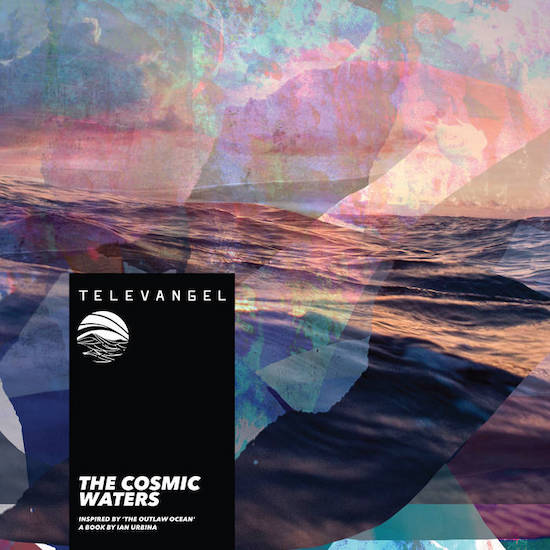When we think of injustice at sea our minds tend to go under the waves, to whales with guts full of rubber or dolphins struggling in nets, most of us unaware of the similarly chaotic state of the surface simply because it’s not reported. The cliché image of the mind as an ocean offers itself as an apt metaphor in this case, albeit an inverted one. How can man control the surface of his thoughts if he hasn’t conquered the beast in the depths? After reading Ian Urbina’s The Outlaw Ocean, it’s clear to see the beast is still very much alive – and not just alive but thriving on the lawless frontier of the open sea.
In Cosmic Waters, Televangel (otherwise known as Young God, né Ian Taggart, formerly one half of Blue Sky Black Death) creates a fractured narrative through the field recordings and spoken word taken from Urbina’s five year investigation into the anarchic high seas that led to the book. Snippets of his conversation with a stowaway is played on the track of the same name and left to float in Televangel’s ambient backdrop like jettisoned debris. It leaves you wanting to know the full story. For those that have read the book, tracks like ‘Storming the Thunder’ hold extra gravitas. The radio comms, gradual build-up and sudden burst of momentum simulating Sea Shepherd’s three month chase to arrest the infamous illegal toothfish fishing vessel Thunder.
Running through Cosmic Waters is an uneasy dialogue between the inherent poetics of the ocean and the human transgressions that have always marred its beauty. Taggart doesn’t create a melancholic soundtrack to mirror the tragic undertones of Urbina’s recordings though, there is a buoyancy to the production that fights to keep a sense of hope afloat in the face of a seemingly unwinnable situation. It’s a noble undertaking, yet one that might be misunderstood on first listen.
For example In ‘Maritimes’, Urbina’s prose about the secret war between governments and conservationists, tussling for access and control of the sea bottom, unexpectedly leads to a string of the record’s signature warbly high-pitched samples that sound like teenage mermaids circling a diver. The mind struggles to find a connection between the art and the facts, but that’s the whole point. Cosmic Waters isn’t trying to forge a connection between the two; it doesn’t try to convince the listener that the ocean is a bad place, but rather – just like the land – a beautiful place with bad people in it.
There is an undeniably feminine essence that breathes life into the soundscape, a bubbly sun-soaked cadence that re-energises the reflective lapses in tempo and pace. It feels like a shuffling toward Mother Nature. Like an unashamed dissociation from the destructive impulses that are so often associated with the patriarchy. Under the rose-coloured exterior of Cosmic Waters there is a blaze of injustice so hot that Televangel throws a fire blanket over it. The question is whether the listener will take off the cover and face the heat, or simply go about their daily business without giving a second thought to the state of the outlaw ocean.
While a lot of their fans are still mourning the untimely end of Blue Sky Black Death, Young God has moved swiftly and smartly on from the production duo’s cult legacy with his reinvention as a solo artist. As a fan it feels only right to respect that by following suit and moving on too. Considering the lousy political and environmental situation the planet is in right now and his strong opinions on those matters, it’s only right that the lines between art and activism are becoming blurred for Televangel. And that is most definitely a good thing.


